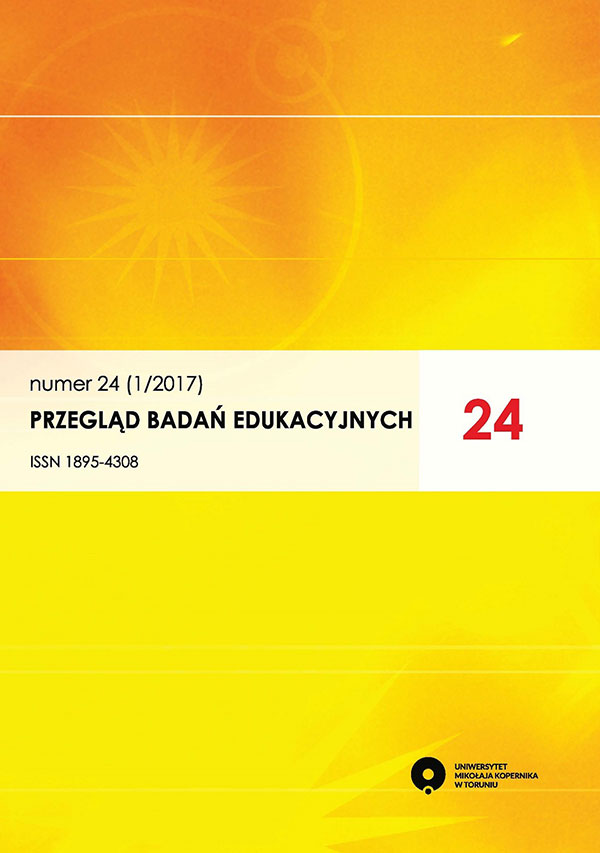Przegląd badań reprezentacji społecznych obiektów i zjawisk z obszaru edukacji – część 2
DOI:
https://doi.org/10.12775/PBE.2017.011Słowa kluczowe
teoria reprezentacji ról społecznych, edukacja, praca nauczycielaAbstrakt
Celem tego artykułu jest promocja teorii reprezentacji społecznych stworzonej, opisanej i opracowanej przez francuskiego psychologa Serge'a Moscovici w badaniach pedagogicznych. Artykuł Teoria reprezentacji społecznej autorstwa Serge Moscovici. Jakościowe metody gromadzenia i analizy danych (część 1) przedstawiają szeroki zestaw metod jakościowych. Proponowany tekst (część 2) podaje przykłady podejścia, które łączy strategie jakościowe i ilościowe realizowane w ramach paradygmatu teorii reprezentacji społecznych. Artykuł zawiera eksplorację wybranych reprezentacji przedmiotów i zjawisk kluczowych dla obszaru edukacji Metaanaliza ogranicza się do następujących zagadnień: postrzegania roli i funkcji nauczyciela, potencjału edukacyjnego dzieci, współpracy, inteligencji, edukacji włączającej oraz innych zagadnień związanych z teorią i praktyką edukacyjną, np ze szkolnej dydaktyki.
Bibliografia
Abric, J.C. (2001), The Structural Approach of Social Representations, w: K. Deaux, G. Philogène (red.), Social Representations: Bridging Theoretical Traditions, Blackwell Publishing, Malden.
Carugati F., Selleri P. (2011), …Once Upon a Time… The Case of Social Representations of Intelligence, „Papers on Social Representations”, Vol. 20, s. 33.1–33.15.
Castellotti V., Moore D. (2002), Social Representations of Languages and Teaching.Language, Council of Europe, Strasbourg.
Creswell J.W. (2013), Projektowanie badań naukowych. Metody jakościowe, ilościowe i mieszane, tłum. J. Gilewicz, Wydawnictwo Uniwersytetu Jagiellońskiego, Kraków.
Ferrara M., Friant N. (2015), The Application of a Multi-Methodology Approach to a Corpus of Social Representations, „Qual Quant”, VI, 1-19; DOI 10.1007/s11135-015-0203-3.
Flick U., Foster J., Caillaud S. (2015), Researching Social Representations, w: G. Sammut, E. Andreouli, G. Gaskell, J. Valsiner (red.), The Cambridge Handbook of Social Representations, Cambridge University Press, Cambridge.
Francia G. (2011), Children’s Right to Equitable Education: A Welfare State’s Goal in Times of Neoliberalism, „Education Inquiry”, Vol. 2, No. 3, s. 453–471.
Gawda B., Szepietowska E.M. (2015), Treść pojęć Radość i Strach w okresie dorosłości – fluencja werbalna jako narzędzie opisu pojęć emocjonalnych, „Psychologia Rozwojowa”, t. 20, 2, s. 57–72.
Gorgorió N., de Abreu G. (2009), Social Representations as Mediators of Practice in Mathematics Classrooms with Immigrant Students, „Educational Studies in Mathematics”,
nr 72, s. 61–76.
Howarth C. (2004), Representation and Resistance in the Context of School Exclusion: Reasons to be Critical, „Journal of Community and Applied Social Psychology”, nr 14, s. 356–377.
Howarth C. (2006), A social representation is not a quiet thing: exploring the critical potential of social representations theory, „British Journal of Social Psychology”, nr 45(1), s. 65–86. DOI: 10.1348/014466605X43777.
Menin M.S., Shimizu A., Lima A.C. (2011), The Theory of Social Representation as a Theoretical and Methodological Tool for Research on Teachers in Brazil: Analyses of Theses and Dissertations, w: M. Chaib, B. Danermark, S. Selander (red.), Education, Professionalization and Social Representations. On the Transformation of Social Knowledge, Routledge, London.
Męczkowska A. (2002), Od świadomości nauczyciela do konstrukcji świata społecznego, Oficyna Wydawnicza „Impuls”, Kraków.
Miguel I., Valentim J., Carugati F. (2010), Intelligence and its Development: Social Representations and Social Identities, „Papers on Social Representations”, Vol. 19, p. 20.1–20.33.
Moliner P., Abric J.C. (2015), Central Core Theory, w: G. Sammut, E. Andreouli, G. Gaskell, J. Valsiner (red.), The Cambridge Handbook of Social Representations, Cambridge University Press, Cambridge.
Mugny G., Carugati F. (1985), Social Representations of Intelligence, Cambridge University Press, Cambridge.
Pilch T. (1995), Zasady badań pedagogicznych, Wydawnictwo Akademickie Żak, Warszawa.
Placco V.M., de Souza V.L. (2011), Social Representations and Cultures of Action, w: M. Chaib, B. Danermark, S. Selander (red.), Education, Professionalization and Social Representations. On the Transformation of Social Knowledge, Routledge, London.
Räty H., Komulainen K., Hirva L. (2012), Social Representations of Educability in Finland: 20 Years of Continuity and Change, „Social Psychology of Education”, Vol. 15, s. 395–409.
Räty H. (2015), Notions of Intelligence and Social-Educational Identity, „Educational Studies”, 41:3, s. 272–275, DOI: 10.1080/03055698.2014.989814.
Räty H., Snellman L. (1998), Social Representations of Educability, „Social Psychology of Education”, Vol. 1, No 4, s. 359–373.
Sammut G., Andreouli E., Gaskell G., Valsiner J. (red.). (2015), The Cambridge Handbook of Social Representations, Cambridge University Press, Cambridge.
Silva, A. de (2012), Social Representations of Undergraduates about Teacher Identity and Work a Gender Perspective, „Educação, Sociedade & Culturas”, nr 36, s. 49–64.
Sousa C. de (2011), Education Processes of the Teacher as an Apprentice, w: M. Chaib, B. Danermark, S. Selander (red.), Education, Professionalization and Social Representations. On the Transformation of Social Knowledge, Routledge, London.
Tuval S. (2014), Teachers Living with Contradictions: Social Representations of Inclusion, Exclusion and Stratification in Israeli Schools, „Papers on Social Representations”, Vol. 23, s. 10.1–10,25.
Pobrania
Opublikowane
Jak cytować
Numer
Dział
Statystyki
Liczba wyświetleń i pobrań: 679
Liczba cytowań: 0



